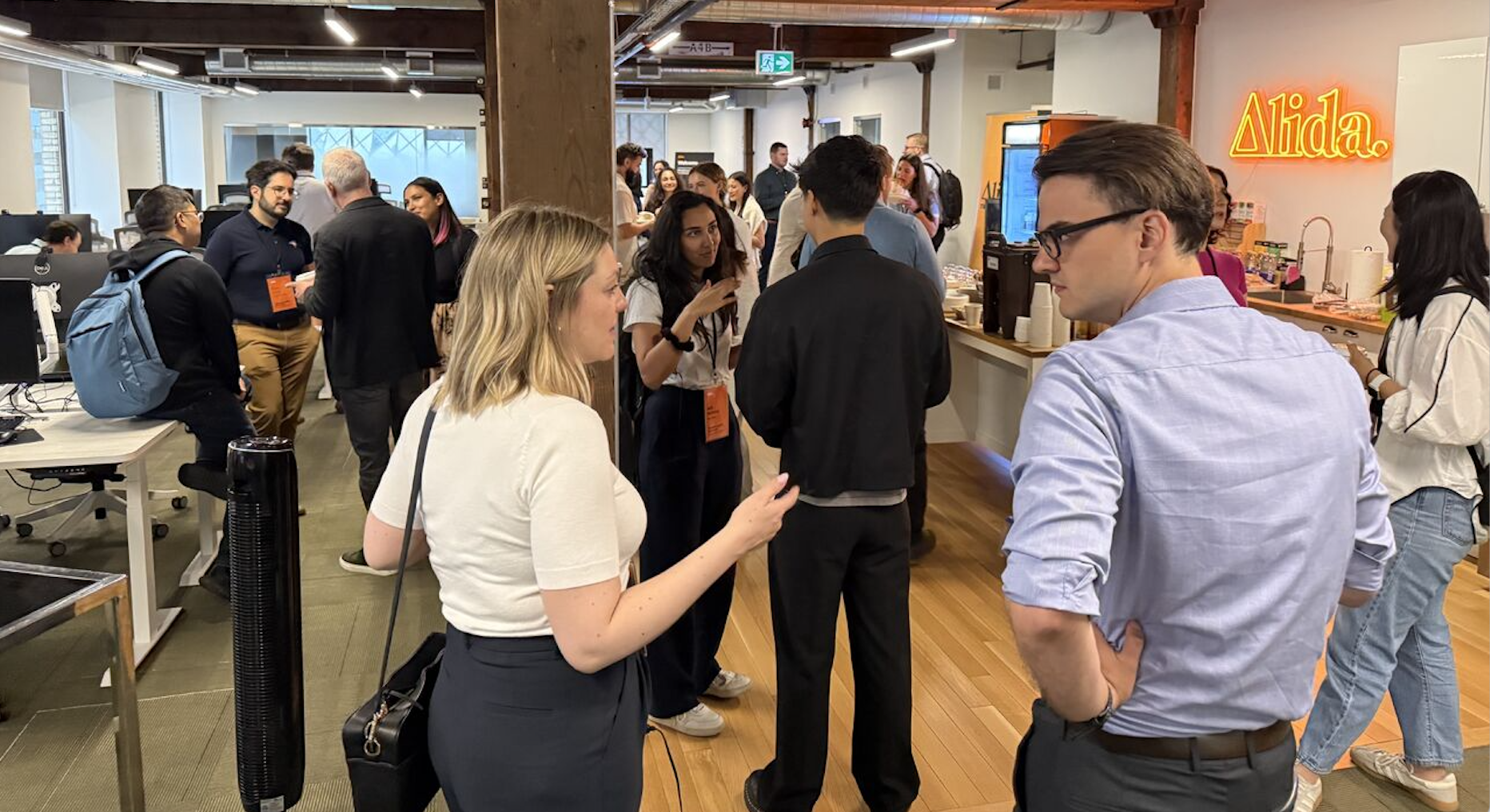Big thanks to the team at Learners for putting on a fantastic Research Week event in San Francisco. It was energizing to be in a room full of insight professionals from companies like Airbnb, Google, Meta, and Okta, all sharing their experiences, struggles, and ideas for what’s next in our field.
What was top of mind for attendees at the event? Across conversations, panels, and hallway chats, a few themes kept coming up. Many attendees were wrestling with how to scale insights in fast-moving environments, how to maintain the value of research when budgets tighten, and how to make their work more visible to senior leadership. There was also a strong undercurrent of curiosity about AI—how it might change our workflows, where it can support (or threaten) the role of the researcher, and what ethical considerations we need to bring to the table. And above all, there was a shared desire to make research more actionable: moving beyond decks and dashboards to real impact.
Read on to see the three topics that were on everyone’s mind at Research Week.
1. Work Yourself Out of a Research Job… and Into Leadership
One of the biggest themes across several sessions was the idea that researchers are well-positioned to take on leadership roles in organizations—not just influencing decisions but making them. Why? Because researchers deeply understand users, bring empathy to every conversation, and solve problems based on evidence. That combination is invaluable across product, marketing, customer success, and beyond.
So how do you get there?
Here’s a combination of advice we heard (and a few ideas of our own):
- Solve problems that matter — Mario Mijares from 7-Eleven put it well at Alida’s Activate event: “Don’t ask me to research interesting things; ask me to research problems that will have a business impact.”
- Step up as a problem-solver — Be the person who takes initiative when something’s unclear. Leadership often looks like volunteering to figure things out when no one else will.
- Use your empathy on leadership — Understand what leaders care about, how they measure success, and the language they use. Speak to their goals, not in research jargon.
- Help leaders make decisions — Don’t just present findings; recommend courses of action. Leaders make decisions with imperfect data every day. Stop waiting for perfect and start offering smart paths forward.
- Find your voice — If you know the customer better than anyone in the room (and you probably do), don’t be afraid to speak up.
- Tell stories — Stories make insights stick. Share your findings in a way that’s memorable and easy to repeat. Great insights deserve great storytelling.
Alida empowers UX researchers to dig deeper into customer behavior through engaged user communities built for continuous, long-term research. By uncovering the “Why?” behind user actions, research teams generate insights that address the root of business challenges—not just the symptoms. These are the kinds of insights you can take to the boardroom—strategic, defensible, and ready to drive action.
2. Taking Credit for Insights and Ideas
Another hot topic: what happens when you share a great insight… and then months later, a senior leader repeats it (hello, Zuck) like it was their idea?
We’ve all been there. And while it’s frustrating, here are some reflections we’ve had over the years:
- Plant the seed — Sometimes, planting an idea with enough influential people is what gets it traction. We’ve learned to be okay with that when the outcome is more important than the credit.
- But also: take credit for impact — Career growth often requires visibility. And yes, that means owning your role in a business outcome. Even if it wasn’t a perfect A-to-B-to-C causation chain, insights are often the spark that starts the fire. So say it: “We learned this → X team did that → and it improved Y.”
- Again: tell stories — Data alone won’t get you remembered. But a story about a customer, an insight, and a result? That will.
Alida helps researchers connect the dots from insight to action to impact—so you can own your value with confidence. From customizable dashboards to dynamic video reels, the platform makes it easy to show not just what you learned, but what it changed. Because in today’s landscape, it’s not enough to be insightful—you need to be unforgettable.
3. Challenging Economy = Hidden Opportunity
The job market is tough right now—several people we met at Research Week were actively looking for work. But panelists shared thoughtful, practical advice for researchers navigating this moment.
Here are a few points that resonated with us:
- People leaving = opportunity — When folks move on, the need for customer understanding doesn’t go with them. Step up to fill the gap.
- Be a problem solver — When companies are under pressure, they value people who solve real problems. Don’t wait for the perfect role—go where you can make a difference.
- Shape shift — Your research skills are incredibly transferable. Product management, customer success, marketing—these fields are hungry for people who can ask good questions, interpret data, and build understanding.
- Use downtime to skill up — If you're between roles or projects, it’s the perfect time to stretch into adjacent areas. Strengthen your storytelling, learn a new tool, or explore a different function.
Alida helps you do more with less—without compromising impact. Whether you’re working solo or as part of a lean team, the platform streamlines everything from participant recruitment to longitudinal tracking. That means faster cycles, lower costs, and more time spent on what really matters: solving meaningful problems and proving your worth—wherever you take your skills next.
Final Thoughts
Research Week reinforced a principle that guides our work: the role of research isn’t just to uncover insights—it’s to drive action. Whether it’s influencing decisions, stepping into leadership roles, or connecting the dots others might miss, researchers are uniquely positioned to lead in today’s complex, customer-centric world.
At Alida, we understand that today’s UX research challenges require more than just tools—they demand a partner who gets the nuance of modern research roles. Whether you're stepping into leadership, fighting for credit, or navigating resource constraints, our platform is built to support you every step of the way. With powerful capabilities for continuous discovery, seamless storytelling, and agile execution, Alida empowers you to not only uncover game-changing insights—but to make sure they drive real, measurable impact. We're here to help you lead with confidence, own your influence, and turn research into a strategic advantage. Let’s shape the future of customer-centric innovation, together.







